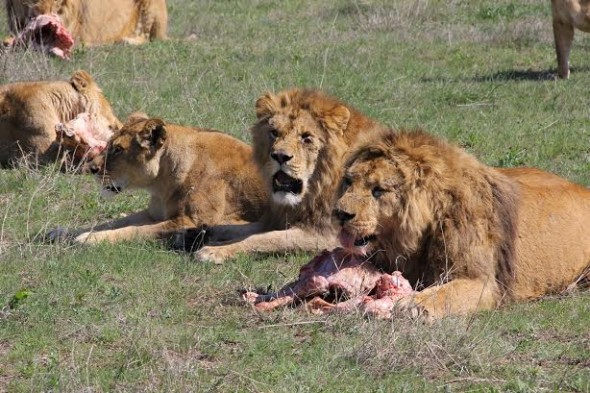
SA Expat Steps Up to Rescue Starving Animals in the Ukraine
A semi-retired South African expat has stepped up to become an unlikely hero in the Ukraine where he is working tirelessly to rescue thousands of zoo animals – affected by the revolution – from starving to death. Lionel de Lange (48), who has lived in the Ukraine since 2006 and still has a business in South […]

A semi-retired South African expat has stepped up to become an unlikely hero in the Ukraine where he is working tirelessly to rescue thousands of zoo animals – affected by the revolution – from starving to death.
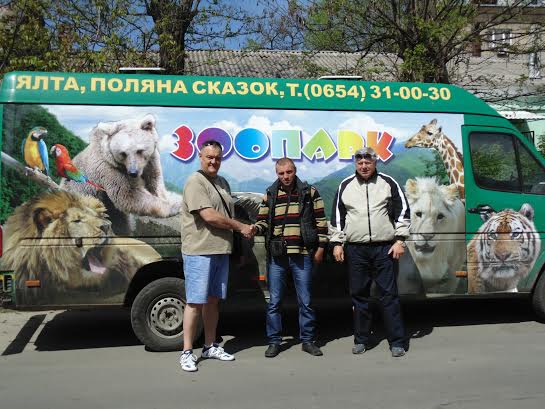
Lionel de Lange (48), who has lived in the Ukraine since 2006 and still has a business in South Africa, felt compelled to do something to take care of the animals when he learnt through Facebook about their plight since the Maidan revolution began.
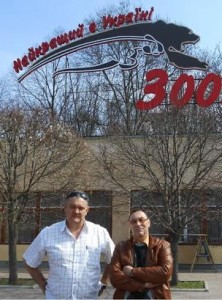
Some of the starving animals were in a zoo just 10 km away from his home in Nikoleav. So he called up his sister in SA for advice, and she remembered the late Lawrence Anthony, an amazing South African (and author of ‘The Elephant Whisperer’) who had rescued zoo animals in Baghdad during the 2003 Iraq War.
Although Anthony passed away in 2012, his foundation – the Lawrence Anthony Earth Organization (LAEO) – still operates around the world. De Lange contacted LAEO director Barbara Wiseman to see if the LAEO could assist, but instead she not only helped him devise a plan to help the animals…she also encouraged the South African entrepreneur to found the Ukrainian chapter of LAEO.
So now, as head of the LAEO Ukraine, de Lange has passionately taken on the hugely challenging task of saving these animals from starving to death.
The animals “are all just innocent victims of this international conflict,” says de Lange. “We’ve had to basically adopt close to ten thousand animals that are in dire straits in Ukrainian zoos.”
The combined cost to feed the animals at three of the zoos LAEO has taken on – Mezhigor’ye, Nikolaev, and Askania Nova – is about $5,000 a day! The LAEO is also helping deliver tons of meat to 62 lions and other big cats at the Taigan Animal Safari Park in Crimea.

De Lange, who is using his business acumen to help the zoos become self-sustainable rather than reliant on government funding or charity, took some time off from his valiant rescue efforts, to speak to SAPeople:
Have you been involved in animal welfare before?
Never. Just supported my local animal welfare but have always been a massive animal lover.
You’ve lived in the Ukraine since 2006. [Lionel moved over for a girlfriend whom he met online…but the relationship didn’t last.] Do you speak Russian?
Yes, I can speak Russian. I even read it (don’t always understand what I’m reading though) but I can’t write it.
Were you personally affected by the revolution?
Nothing has happened to me. I steer clear of the trouble. We are a non-political organisation and cannot be seen to be taking any side. Also it could jeopardize my residency status. We’ve had small riots and fighting in our city and we’re only 150 km form the Crimean border that was annexed by Russia.
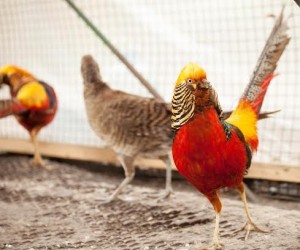
Why were the zoo animals affected by the revolution?
The government is broke, so they cut funding to non-essential services and zoos are considered non-essential.
What are you currently aiming to achieve for the animals – what is the end goal?
At the moment we are just trying to make sure we keep all the animals fed, healthy and alive and that takes money. If we were not in a crisis situation here and the zoos had normal attendance then they could possibly cope with buying food for the animals, but because of the political and economic situation attendance at the zoos are way below normal levels.
What are the biggest challenges or obstacles? What has shocked you the most?
Knowing that tomorrow we’ll have enough food for the animals and trying to build a trusting relationship with suppliers.
Corruption is a huge problem here. Two weeks ago we found a family of five bears living in appalling conditions. The father bear has been locked in a 4m x 6m steel enclosure since the fall of the Soviet Union. That makes him at least 23 years old and he has never been outside that steel box!
His two daughters have two cubs and they live in an enclosure the same size as his. The cages have metal floors which are breaking up and rusting and the urine and faeces just fall through; the smell is unbelievable. We’re currently trying to get funding to help them but it’s expensive. Approximately $35,000 is what we need for that project alone.
Have you been pleasantly surprised by any people/organisations through this entire experience?
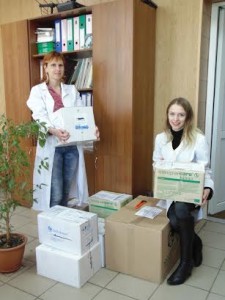
Yes, the people working at the some of the zoos are amazing and my assistant here, Alina – I could not do any of this without her.
The most pleasant and surprising experience was when I contacted LAEO in Los Angeles and South Africa, Barbara Wiseman from LA and Yvette from South Africa were amazing. Their quick response to the crisis and the professional way in which they handled everything was great. I just wanted to get someone to help these animals but the more I spoke with them the more I wanted to get involved.
The work they are doing around the world is outstanding and they don’t just throw money at a problem to fix it but work out ways that the problem gets resolved and initiate plans so that is does not occur. LAEO is no ordinary environmental organisation – other organisations can learn a lot from them. We are now – because of their attitude I’m the proud director of LAEO Ukraine.
I believe there are South African eland at former President Viktor Yanukovych’s private zoo at his abandoned palace. Do you know if that’s true? And who is taking care of the animals there? Have you visited it?
Yes, it’s true. They are so tame I’ve even been in their enclosure and patted them. There are some volunteers working there but we are supplying the necessary food and medication and paying a small salary to two of the self-appointed keepers of the Palace Zoo. They were fired from their positions at the Kiev zoo for assisting at Mezhigoriye (the Estate’s Name)
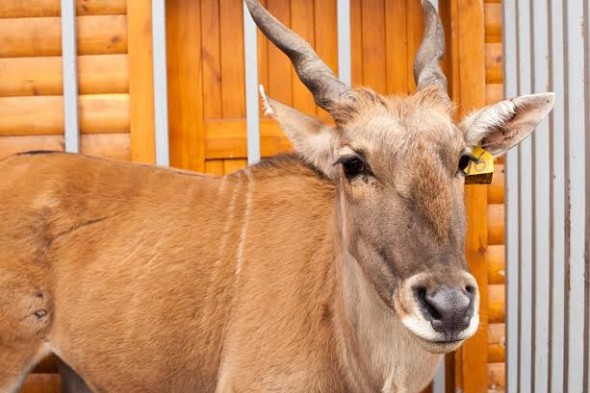
In what way can you see that all your efforts ARE worth it?
That no animals have died or gone hungry or been stolen since we started assisting.
You’ve spoken about the widespread corruption in the Ukraine and how difficult it is to get people to trust you. What about trusting other people? In some interviews you mention gangsters. Do you ever fear for your own safety?
Corruption is a huge problem. I’ve been approached by a few people that want me to buy meat and products from them. My response is that if their price is better than I’m currently paying then we can do business and if they have necessary documentation. I don’t fear for my life, but I have to be very careful what I say or do.
Do you think being South African – growing up with wildlife – has made you perhaps care more about the plight of the animals than people who aren’t from Africa? (It’s interesting that Lawrence Anthony – who also rescued animals in a troubled part of the world – was also South African.)
I don’t know if wildlife had anything to with it. We always had pets and treated them with love and respect. I learnt that from my Dad.
Do you see any similarities between the Ukraine and South Africa? Or is it very different dealing with people there as to dealing with people in SA?
No similarities at all!
Is there any way that other South Africans around the world could help?
Yes, obviously with donations (every rand counts) but I understand things are tight, but just spreading the word would help immensely. We have offices around the world; even just donating a bit of their time to any of the causes we are working on will help in some way.
Everything is connected to each other in some way.
UPDATE: PLEASE DONATE BEFORE MIDNIGHT TONIGHT (Friday 17 October, 2014) – DONATE HERE.
IF YOU CAN HELP, OR SPREAD THE WORD – PLEASE DO:
- Crimea’s Taigan Park has more than 1000 animals in addition to their 62 big cats who consume 500KG of meat per day at a cost of $1280 per day.
- Also receiving support from LAEO is: Nikolaev Zoo (5,735 animals), Mezhigor’ye, the exiled ex-President Yanukovych’s private zoo (over 2,000 animals), and the Askania Nova Biosphere Reserve.
- LAEO has to raise $5000 a day to cover these costs. Both LAEO US and Ukraine say they are barely staying ahead of these demands and are urgently looking for more funding sources.
- No other organizations have offered assistance, funding through government authorities is non- existent and the prospect of funds coming in from paying tourist attendance is very bleak.
Visit www.LAEOUkraine.org
Watch a video of the lions in Crimea receiving meat de Lange and his team supplied to them.
“Everything is connected to each other in some way” – Lionel de Lange
